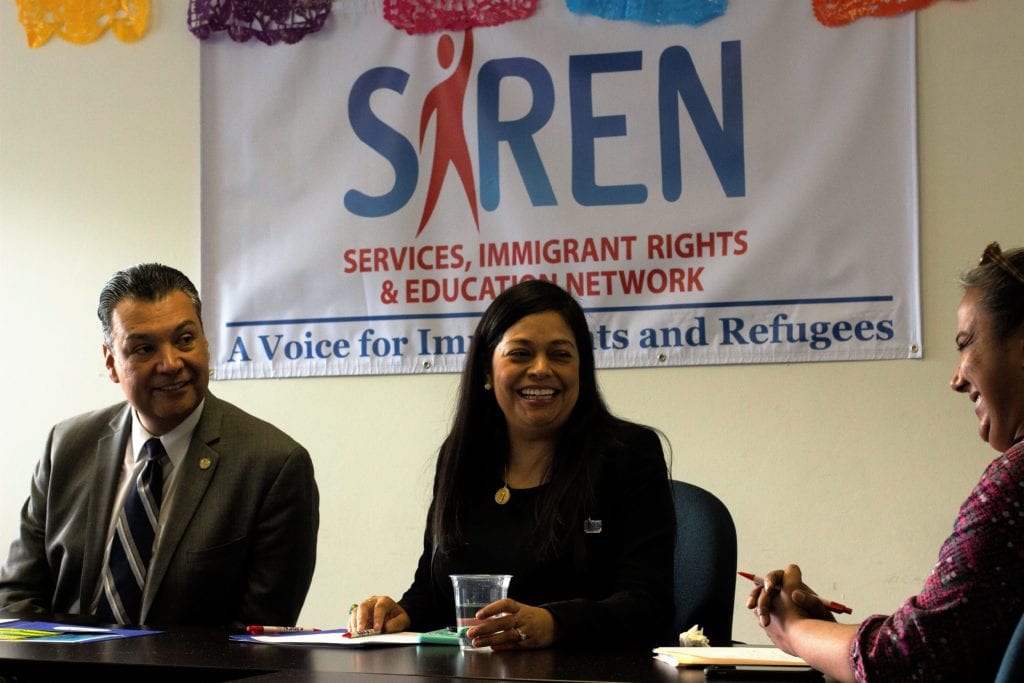San Jose activists on Friday called on the U.S. Supreme Court to delay a ruling on the Deferred Action for Childhood Arrivals (DACA) program amid the novel coronavirus outbreak.
During a livestream hosted by immigrant rights group SIREN, Executive Director Maricela Gutiérrez led the call to salvage the Obama-era program through a Zoom call, which has become the norm in the social distancing era amid the COVID-19 pandemic.
The future of the DACA program, which provides deportation protection to undocumented immigrants who were brought to the country illegally as children, hangs in the balance after President Donald Trump in 2017 ended the program but called on Congress to find a legislative fix. The program has provided protections to some 650,000 people across the nation.
The city of San Jose and Santa Clara County in 2017 sued Trump for rescinding DACA. In the complaint, the county said 38 percent of its residents are foreign born, the highest percentage of foreign-born residents of all counties in California.
Lower courts have stifled Trump’s actions and upheld the program, but the administration appealed the case to the Supreme Court, which heard oral arguments but has not issued a ruling.
But Gutiérrez and other advocates said the decision should be delayed as the country grapples with the unprecedented public health crisis that has killed 38 people and infected 1,094 in the county. And many of those immigrants at risk of deportation are providing the “essential services” needed now more than ever.
“The fact that we can’t even gather in person is a legitimate reason why the Supreme Court should delay its ruling on the DACA program,” Gutiérrez said during the call with reporters and DACA recipients from the Bay Area and Fresno. “In the middle of a global pandemic, DACA recipients should not have to worry about losing their protections from deportation.”

Advocates expect a ruling between now and June, Gutiérrez said.
In the meantime, SIREN is demanding the Trump administration halt all deportations, automatically renew DACA recipients’ existing two-year work permits that give them legal status in the country, and for Congress to pass the Development, Relief and Education for Alien Minors (or DREAM) Act to create a pathway to citizenship for millions of undocumented people.
The effects of ending DACA amid the pandemic, advocates say, would have disastrous implications for families, employers and the immigration system itself. Some 27,000 recipients are employed in health care, according to the Center for American Progress, a liberal think tank. Tens of thousands more work in agriculture, food processing, transportation and education, all essential services under Gov. Gavin Newsom’s shelter at home order.
Kevin Lee, a policy aide to Santa Clara County Supervisor Dave Cortese, outlined county policies like the eviction moratorium meant to help residents in Friday’s teleconference. He also shared his own experience as a DACA recipient.
He moved to the U.S. from South Korea when he was 5 and couldn’t work or go to college out of high school in 2008 because he didn’t have legal status in the U.S. Initially, he said his parents helped take care of him until he received DACA a year after Obama enacted the program in 2012, which Lee later realized was a luxury.
He said the Supreme Court should show “a modicum of compassion” so that “people like myself can concentrate on taking care of myself and our loved ones during this time of upheaval.”
Silicon Valley De-Bug organizer and DACA recipient Cecilia Chavez said she wouldn’t know what to do if the program ended. Originally from Guadalajara, Mexico, she’s lived in the U.S. for 25 years.
“This global pandemic has shown us that we need to be together more than ever,” she said. “This is not a political issue, it’s a personal issue.”
Gutiérrez said her organization has received notices of immigration enforcement actions amid the outbreak. As recently as March 16, the Los Angeles Times reported that ICE was detaining immigrants in Los Angeles County.
While his DACA status provides temporary relief, East San Jose poet Yosimar Reyes pointed to the work he, his family and other undocumented people have done in Silicon Valley. He pointed to his own work in a Fremont electronics factory.
“It’s oftentimes that we don’t really acknowledge that we are the essential workers who are keeping the country together,” Reyes said, “it goes without saying.”
Contact Eduardo Cuevas at [email protected] or follow @eduardomcuevas on Twitter.



Leave a Reply
You must be logged in to post a comment.